Reflecting Forward: 50 Years of TESOL
 "TESOL IS BORN. After months of planning by an ad hoc committee representing the five cooperating organizations, Teachers of English to Speakers of Other Languages (TESOL) was created as a permanent association at a business meeting held in the Statler-Hilton Hotel, New York City, in the afternoon of Friday, March 18, 1966." Published in TESOL Newsletter 1, June 1966 "TESOL IS BORN. After months of planning by an ad hoc committee representing the five cooperating organizations, Teachers of English to Speakers of Other Languages (TESOL) was created as a permanent association at a business meeting held in the Statler-Hilton Hotel, New York City, in the afternoon of Friday, March 18, 1966." Published in TESOL Newsletter 1, June 1966
TESOL at 50!
Through the rest of 2015 and all of 2016 TESOL will be reflecting on the past 50 years as well as looking forward to what the future holds for the profession. TESOL’s 50th Anniversary Committee has created opportunities to recognize outstanding English language professionals in the field.
-
The 50 at 50 list recognizes 50 individuals who have contributed significantly to the profession.
-
-
TESOL Success Stories seeks to share the impact that ESOL teachers have had on students in all parts of the world.
You can nominate outstanding colleagues and share success stories on TESOL’s recently launched 50th Anniversary website. The website will showcase these individuals and stories. It also includes an interactive timeline where members can share milestones in the history of the association. Additionally, each month the site will feature a TESOL affiliate, sharing the affiliate’s story as part of the TESOL family.
Celebrate at the 2016 TESOL Convention & English Language Expo
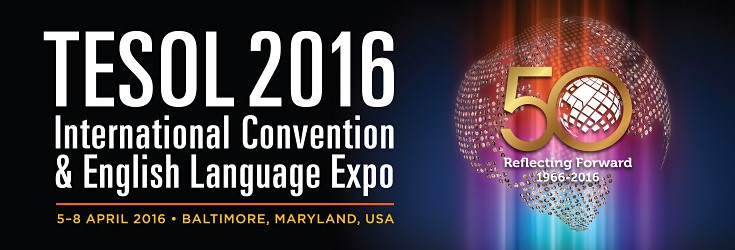 The big celebration will take place during the first week of April 2016 at the TESOL Convention & English Language Expo in Baltimore, Maryland, USA. In addition to the great learning and networking opportunities at the convention, TESOL will host special 50th Anniversary activities, including a few surprises. TESOL will also publish a commemorative book and recognize the five founding associations. The celebration will close with a big block party honoring the association, the field, and English language teaching professionals around the world. The big celebration will take place during the first week of April 2016 at the TESOL Convention & English Language Expo in Baltimore, Maryland, USA. In addition to the great learning and networking opportunities at the convention, TESOL will host special 50th Anniversary activities, including a few surprises. TESOL will also publish a commemorative book and recognize the five founding associations. The celebration will close with a big block party honoring the association, the field, and English language teaching professionals around the world.
TC Monthly Giveaway Congratulations to Tiffany Ellis of Indiana, USA, for being the winner of the July 2015 TESOL Connections Monthly Giveaway. Tiffany has won a free adult learners book set.
This month, TESOL is giving away a free
subscription to TESOL Quarterly!
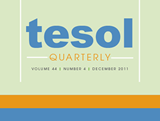
TESOL Quarterly, a refereed professional journal, fosters inquiry into English language teaching and learning by providing a forum for TESOL professionals to share their research findings and explore ideas and relationships in the field. The Quarterly's readership includes ESOL teacher educators, teacher learners, researchers, applied linguists, and ESOL teachers.
Click here to enter
Drawing closes 26 August 2015, 11:59 pm EST
TESOL Blogs Interested in writing a blog for TESOL?
Contact Tomiko Breland with your idea or for submission details.
Check out the latest TESOL Blogs:
|
Connectivity With Google’s Cultural Institute, by Kristen Lindahl
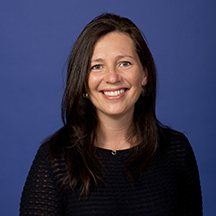 One of the greatest benefits of being online is the global connectivity it brings—connection to other people, other places, other perspectives, and, of course, other languages. Language teachers have been long aware of the connection between language learning and cultural ties, and are often very creative in bringing culture into the classroom and creating experiences for students outside of it, as well. One of the greatest benefits of being online is the global connectivity it brings—connection to other people, other places, other perspectives, and, of course, other languages. Language teachers have been long aware of the connection between language learning and cultural ties, and are often very creative in bringing culture into the classroom and creating experiences for students outside of it, as well.
A current tool that TESOL educators might find intriguing for these purposes is Google Cultural Institute, which has brought Google’s unique technology to the world’s art galleries and museums. Read More. |
|
Discussing Same-Sex Marriage in ELT: A Survey Approach, by Alexandra Lowe
 One of my goals as an instructor in an intensive English program (IEP) has been to encourage my students to pay more attention to the news in the United States. (See “Producing Newscasts for the ESL Classroom“) When students watch the news in English, they strengthen their listening skills, expand their vocabulary, and increase their awareness of American culture. One of my goals as an instructor in an intensive English program (IEP) has been to encourage my students to pay more attention to the news in the United States. (See “Producing Newscasts for the ESL Classroom“) When students watch the news in English, they strengthen their listening skills, expand their vocabulary, and increase their awareness of American culture.
The U.S. Supreme Court’s 26 June 2015 ruling on same-sex marriage was one of several “hot topics” in the news this summer that we tackled in class. Beforehand, I wrestled with the question of how best to approach this issue in a class where I knew that a number of students, because of their religious beliefs, might disagree with the Supreme Court’s decision. Read More. |
|
Controversy in Adult Conversation, by Robert Sheppard
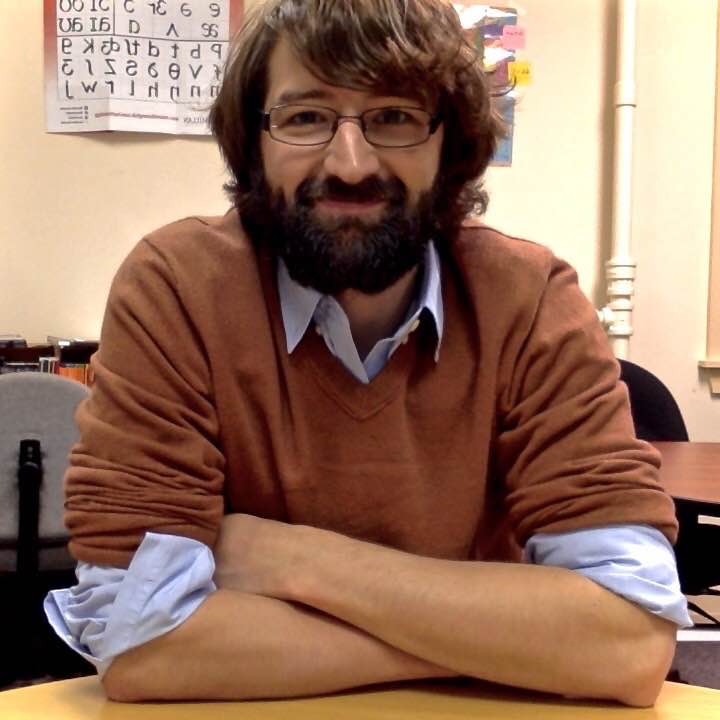 A lot of teachers I’ve spoken with completely avoid contentious topics in their classroom. Of course, the intentions are good: to create an inclusive, congenial atmosphere. And in a world where the language of trigger warnings and safe spaces is spreading rapidly across our higher ed campuses, teachers may feel even more reluctance to introduce any sort of controversy into their classroom. A lot of teachers I’ve spoken with completely avoid contentious topics in their classroom. Of course, the intentions are good: to create an inclusive, congenial atmosphere. And in a world where the language of trigger warnings and safe spaces is spreading rapidly across our higher ed campuses, teachers may feel even more reluctance to introduce any sort of controversy into their classroom.
But at what cost do we excise all disagreement? And does disagreement have to threaten the safe space of the classroom? Read More. |
|
House Wheat This Hound!: The Problem of Listening, by Karen Taylor de Caballero
 If you’re baffled by the title, don’t fret: “House Wheat This Hound!” means nothing in its printed form. When said out loud, however, a listener can find meaning: How sweet the sound! If you’re baffled by the title, don’t fret: “House Wheat This Hound!” means nothing in its printed form. When said out loud, however, a listener can find meaning: How sweet the sound!
Here’s what’s interesting: the listener must be a different person, someone who is not looking at the text. Perhaps that’s why we find “mad gabs” like this one so compelling: Even when we know what we’re supposed to hear, our eyes continue to interfere with our ears, and we are fascinated. Read More. |
TESOL Bookstore

Featured Resources from TESOL Press
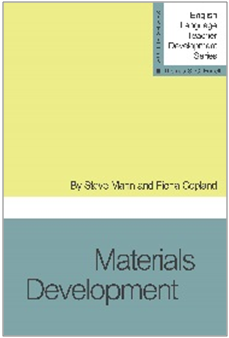 Materials Development Materials Development
Steve Mann and Fiona Copland
Materials play a significant part in lessons, so it is important that these materials fit for purpose. Mann and Copland have elicited and included comments and suggestions from several teachers, teacher educators, and coursebook experts to illustrate their discussions and to bring the practitioner voice into play.
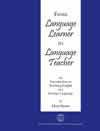 From Language Learner to Language Teacher From Language Learner to Language Teacher
Don Snow, Editor
This volume focuses on the challenges faced by English teachers for whom English is a second (or even third or fourth) language. Four themes receive special emphasis: communicative language teaching, proficiency, language learning, and practicality.
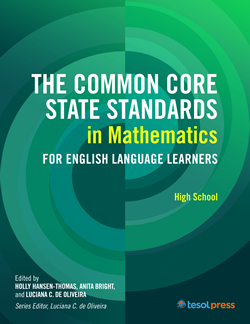 The Common Core State Standards in Mathematics for English Language Learners, High School The Common Core State Standards in Mathematics for English Language Learners, High School
Anita Bright, Holly Hansen-Thomas, Luciana de Oliveira
Copublished with the National Council of Teachers of Mathematics (NCTM), this text explores how high school math content can be made accessible to ELLs. Each chapter provides specific lessons and instructional plans that will not only support students in learning the mathematical content, but also the associated English structures that accompany the content.
|
 |
|
|
 |
| Certified TEFL/TESOL Teachers (Full Time, Long Term), Nanjing Russell Education, Jiangsu province, Nanjing, China
Principal, The Carlos Rosario International Public Charter School, Washington, DC, USA
ESL Faculty Positions, University of Delaware English Language Institute, Newark, Delaware, USA
Online English Coach, 100e.com, Worldwide
ESL Lecturer, Northeastern University, Boston, Massachusetts, USA
Want to post your open positions to Job Link? Click here.
To browse all of TESOL's job postings, check out the TESOL Career Center. |
 |
|
 |
| ADVERTISEMENT |
 |
 |
 |
|
|
 |
| TESOL charter member Edward Mason Anthony Jr. passed away 12 July 2015 at the age of 92. Read the full obituary. |
 |
|
 |
 |
 |
 |
| Hot Topics: The TESOL Blog |
|
 |
|
|
|
 |
|